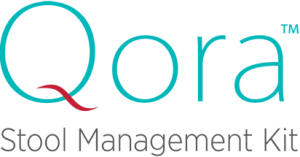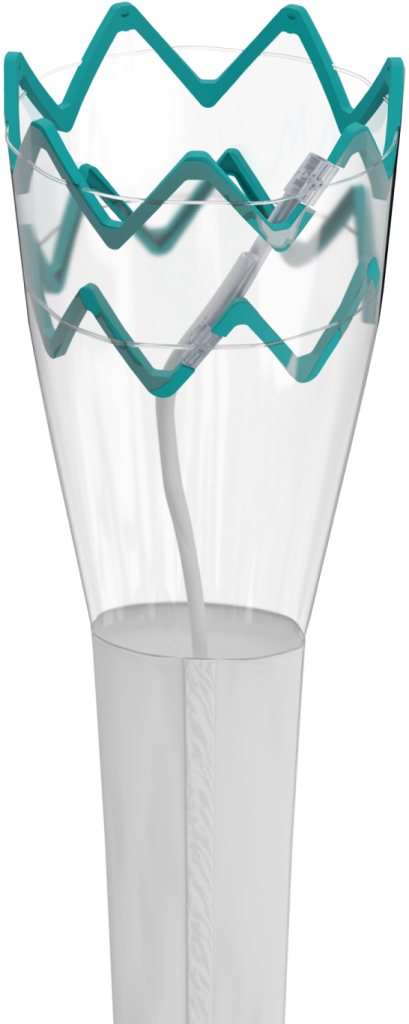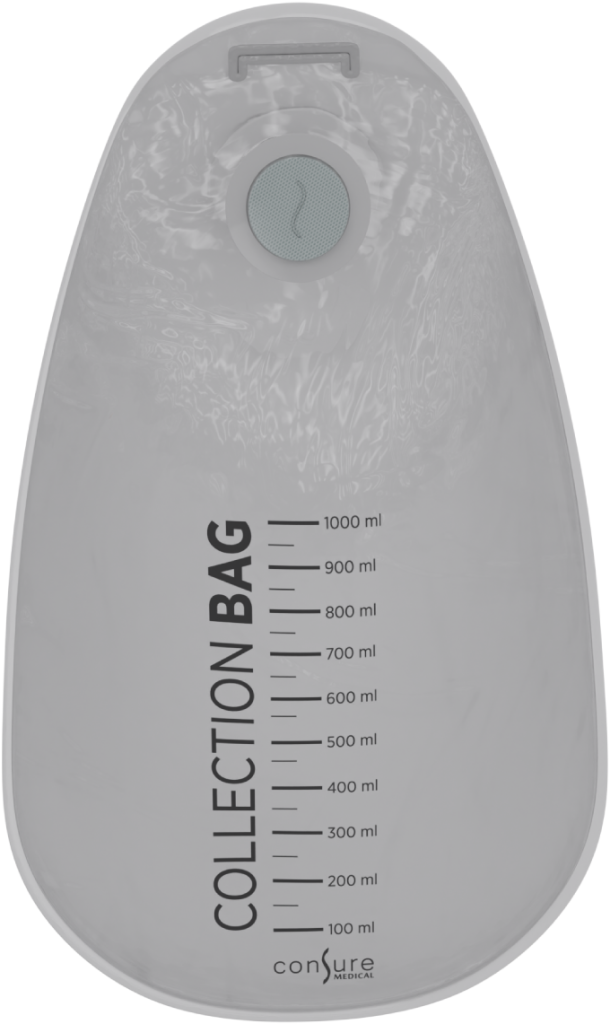
Ergonomic Applicator Insertion
- Hygienic and safe insertion
- Precise and accurate deployment
- Deploys above the Pectinate line
Self expanding lattice conforms to anatomy
- Low radial pressure decreases chances of mucosal injuries
- Works with both tonic and atonic sphincter
- Lumen patency, even during peristalsis
- Indicated for Bristol scale 5, 6 & 7
- 2X faster fluid delivery than IBC’s for patients with Cdifficle and other critical patients
- Also delivers suspension fluids and high volume enema
- For highly infectious patients that require regular stool samples for lab work
- Sample port that is designed for a Slip-Tip syringe helps collect sample without any soiling or contamination
- Purse string based mechanism that collapses the lattice close to its original collapsed size
- Lattice collapses automatically when a restless patient tries to pull out the device and prevents any injury to sphincter or anal canal
- Sheath and collection bag are made of proprietary material that contains malodor
Discreet Stool Collection Bag
- Features a flatus release valve for odorless degassing
- One way valve prevents any backflow
- Accurate output monitoring
Videos
Qora SMK Playlist

2:44

2:28

3:38

3:04

4:54

12:01

0:50

1:01

1:42

1:49

0:55

1:01

1:00

1:34

Are you a nurse caring for elderly frail patients that usually have atonic sphincters?
Is your hospital struggling with intrarectal balloon catheters falling out or leaking fecal material on to the bed linen? Nurses often report that they face leakage issues while using IBCs. On several occasions, as mentioned in FDA MAUDE database as well, nurses have found the indwelling balloon over-inflated, more than the prescribed volume. Indwelling balloon catheters are usually not recommended for acute patients on heparin, anti-coagulants or low platelet count in general.
Balloon catheters are high-pressure (32 – 81 mmHG) balloons that are prone to cause injuries (necrosis, mucosal tear, sphincter dysfunction, etc.) and are not indicated for highly acute patients in ICUs. It is often recommended to be cautious while using IBCs on patients using heparin, anti-coagulants or low platelet count in genera.
Intrarectal balloon catheters with amorphous irrigation channels make it difficult for nurses from being able to administer medications or highly viscous fluids such as vancomycin. Given the risk of high radial pressure and associated injuries, medical errors with over-inflation studies suggest to show caution while using intrarectal balloon catheters.
Qora SMK is the first non-balloon indwelling stool/fecal management system that uses a self-expanding stent (lattice) that is deployed by an ergonomic applicator. This offers a hygienic standardized deployment and minimizes risk of injuries.
The self-expanding lattice is pliable in nature, so Qora stent mimics the anatomy during GI motility and expands and closes with the rectum.
Qora SMK exhibits around 20 mmHG radial pressure which is significantly lower than balloon catheters (32-81 mmHG), lower than the urge to defecate sensation pressure (about 27 mmHG) and lower than the capillary occlusion pressure at about 36 mmHG. The lower pressure ensures the patient’s safety and comfort.
Qora’s self-expanding stent rests on the wall of the rectum (instead of anchoring on anorectal junction) hence providing full natural lumen of the rectum for fecal diversion. Qora SMK has the broadest possible indication and can be used on patients with tonic or atonic sphincter, as well as patients with varied stool consistencies like liquid stool, semi-liquid stool or even semi-formed stool – Bristol 5, 6, & 7.
Qora SMK has a stool sampling port and fastest fluid delivery port that can be used to deliver fluids of dense viscosity. Qora is the only closed-loop faecal/bowel management system that is 100% malodor-containing, a feature that almost all our nurses and family members love.
Qora SMK is the only product in this category – be it rectal trumpets, tubes, balloon catheters, or pouch, that has performed a pre and post-use colonoscopy examination as part of our clinical trials. The stent is MRI-conditional and can be used on acute care patients, transplant patients, burns patients, and chronically ill patients in long-term care or hospice care.
If you have more questions, we can connect you with our Clinical Education or Technical Team to answer them in real-time. Nurses/Hospitals can also request free Qora SMK stool management products for clinical evaluation in your units by writing to us.
LET’S CONNECT
- References available on request. For demo queries drop an email to [email protected]
- For the latest information, always check the “Instructions for Use” that comes packaged with the product.

©2024 Consure Medical. All rights reserved. Consure Medical and Consure Medical logo are registered trademarks of CM Technologies, Inc.
Quick Links
Connect With Us:
Address
USA
Suite 101, 2165 San Diego Ave
San Diego, California 92110
INDIA
253, Okhla Phase 3
New Delhi, Delhi 110020

©2022 Consure Medical. All rights reserved. Consure and the
Consure medical logo are trademarks of CM Technologies Inc.

Ergonomic Applicator Insertion
KEY FEATURES
- Hygienic and accurate insertion
- Precise and accurate deployment
- Deploys above the Pectinate Line

Self expanding lattice conforms to anatomy
- Low radial pressure decreases chances of mucosal injuries
- Works with both tonic and atonic sphincter
- Lumen patency, even during peristalsis
- Indicated for Bristol 5, 6 & 7

Fastest Fluid Delivery
- 2X faster fluid delivery than IBC’s for patients with CDifficle and other critical patients.
- Also delivers suspension fluids and high volume enema
Stool Sample Port
- For highly infectious patients that require regular stool samples for lab work
- Sample port that is designed for a Slip-Tip syringe helps collect samples without any soiling or contamination
Withdrawal Mechanism
- Purse string based mechanism that collapses the lattice close to its original collapsed size.
- Lattice collapses automatically when a restless patient tries to pull out the device and prevents any injury to sphincter or anal canal

End to End Malodor Containment
Discreet Stool Collection Bag
- Features a flatus release valve for odorless degassing
- One way valve prevents any backflow
- Accurate output monitoring

Videos
Qora SMK Playlist

2:44

2:28

3:38

3:04

4:54

12:01

0:50

1:01

1:42

1:49

0:55

1:01

1:00

1:34
Are you a nurse caring for elderly frail patients that usually have atonic sphincters?
Is your hospital struggling with intrarectal balloon catheters falling out or leaking fecal material on to the bed linen? Nurses often report that they face leakage issues while using IBCs. On several occasions, as mentioned in FDA MAUDE database as well, nurses have found the indwelling balloon over-inflated, more than the prescribed volume. Indwelling balloon catheters are usually not recommended for acute patients on heparin, anti-coagulants or low platelet count in general.
Balloon catheters are high-pressure (32 – 81 mmHG) balloons that are prone to cause injuries (necrosis, mucosal tear, sphincter dysfunction, etc.) and are not indicated for highly acute patients in ICUs. It is often recommended to be cautious while using IBCs on patients using heparin, anti-coagulants or low platelet count in genera.
Intrarectal balloon catheters with amorphous irrigation channels make it difficult for nurses from being able to administer medications or highly viscous fluids such as vancomycin. Given the risk of high radial pressure and associated injuries, medical errors with over-inflation studies suggest to show caution while using intrarectal balloon catheters.
Qora SMK is the first non-balloon indwelling stool/fecal management system that uses a self-expanding stent (lattice) that is deployed by an ergonomic applicator. This offers a hygienic standardized deployment and minimizes risk of injuries.
The self-expanding lattice is pliable in nature, so Qora stent mimics the anatomy during GI motility and expands and closes with the rectum.
Qora SMK exhibits around 20 mmHG radial pressure which is significantly lower than balloon catheters (32-81 mmHG), lower than the urge to defecate sensation pressure (about 27 mmHG) and lower than the capillary occlusion pressure at about 36 mmHG. The lower pressure ensures the patient’s safety and comfort.
Qora’s self-expanding stent rests on the wall of the rectum (instead of anchoring on anorectal junction) hence providing full natural lumen of the rectum for fecal diversion. Qora SMK has the broadest possible indication and can be used on patients with tonic or atonic sphincter, as well as patients with varied stool consistencies like liquid stool, semi-liquid stool or even semi-formed stool – Bristol 5, 6, & 7.
Qora SMK has a stool sampling port and fastest fluid delivery port that can be used to deliver fluids of dense viscosity. Qora is the only closed-loop faecal/bowel management system that is 100% malodor-containing, a feature that almost all our nurses and family members love.
Qora SMK is the only product in this category – be it rectal trumpets, tubes, balloon catheters, or pouch, that has performed a pre and post-use colonoscopy examination as part of our clinical trials. The stent is MRI-conditional and can be used on acute care patients, transplant patients, burns patients, and chronically ill patients in long-term care or hospice care.
If you have more questions, we can connect you with our Clinical Education or Technical Team to answer them in real-time. Nurses/Hospitals can also request free Qora SMK stool management products for clinical evaluation in your units by writing to us.
LET’S CONNECT
- References available on request. For demo queries drop an email to [email protected]
- For the latest information, always check the “Instructions for Use” that comes packaged with the product.

©2024 Consure Medical. All rights reserved. Consure and the
Consure medical logo are trademarks of CM Technologies Inc.
Quick Links
Connect With Us:
Address
USA
Suite 101, 2165 San Diego Ave
San Diego, California 92110
INDIA
253, Okhla Phase 3
New Delhi, Delhi 110020

©2022 Consure Medical. All rights reserved. Consure and the
Consure medical logo are trademarks of CM Technologies Inc.